Leading by example
The COVID-19 pandemic put a spotlight on gender-equity issues and contributed to an unprecedented exodus of women from the workforce. Here, nine women in leadership roles at UNMC talk about shaping health care, working through their own struggles and sharing what they've learned to help others succeed.
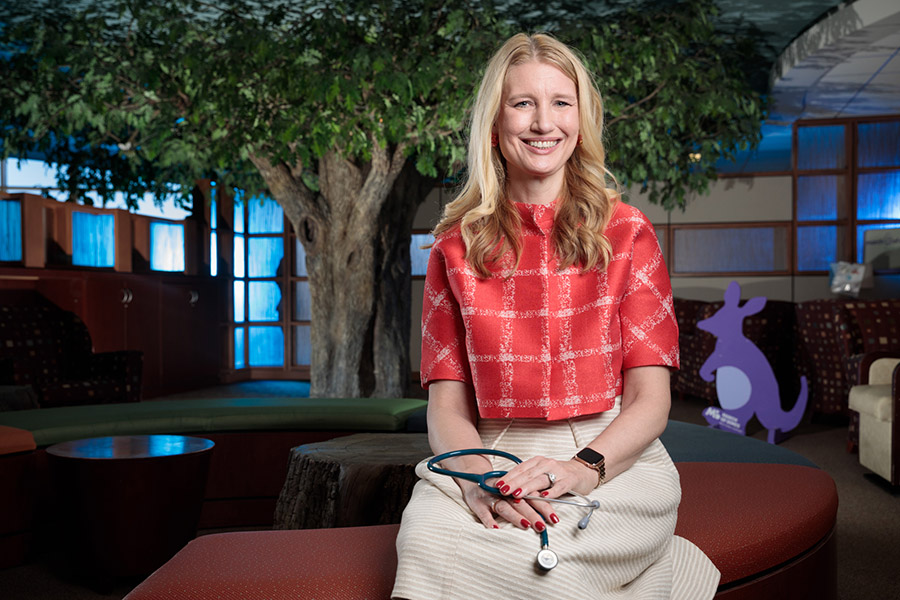
Ann Anderson Berry, MD, PhD, leads a full life as a clinician and researcher at UNMC and a mom.
Ann Anderson Berry, MD, PhD
Executive director, UNMC Child Health Research Institute
What do you wish you’d known when you began your career? UNMC has changed a lot since I joined the faculty in 2004. I had very few mentors, sponsors or advocates at the beginning of my academic career. With changes in senior leadership, UNMC has grown and become an institution where female leaders are valued and welcomed and can make a significant impact. I wish I had known what I was capable of accomplishing early on. I got bad advice that I couldn't be a mom, a clinician and a researcher. My advice is to learn as much as possible, trust yourself to do great work, and say yes to opportunities that engage and excite you.
How do you define success? I consider myself successful if I am engaged in my work, making a difference for people who don't have a voice that is heard on their own, inspiring trainees to learn and choose the best path for themselves and getting out of my comfort zone to try new things.
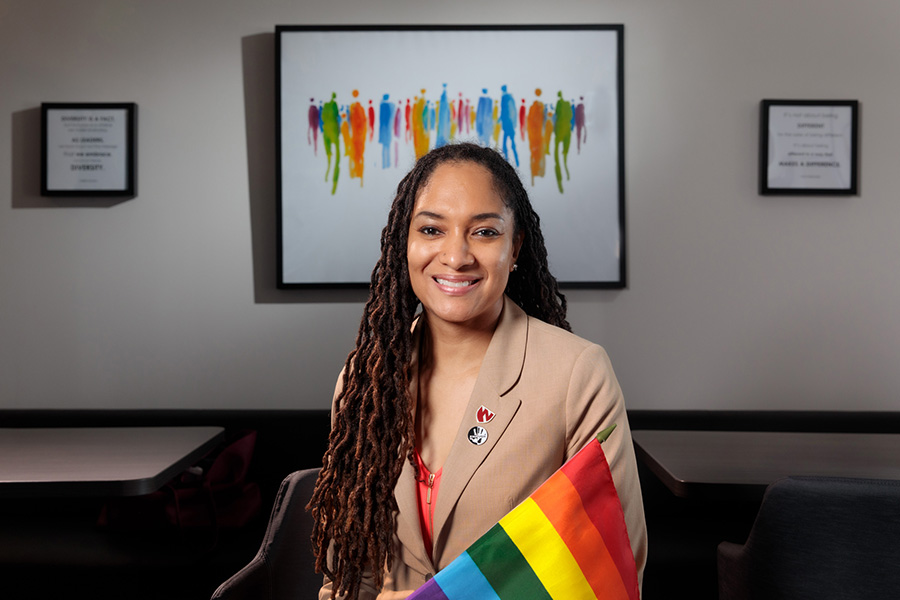
Sheritta Strong, MD, assistant vice chancellor of inclusion at UNMC, encourages women to champion DEI in their communities.
Sheritta Strong, MD
Assistant vice chancellor of inclusion, UNMC
What does "work/life balance" mean to you? There’s no such thing as balance. At any given time, many of us are juggling balls in the air. Some land in our hands, some stay in the air, and others land on the floor. The challenge is making sure the important ones don’t land on the floor.
How do you define success? Success is setting and reaching your goals, no matter how big or small. We can’t discount our small wins, because they set us up for the big wins.
What more could UNMC do to encourage women in leadership roles? Acknowledge that racism, sexism, ableism exist in our institution. Be an active part of championing DEI work instead of expecting the DEI officers and other women to fix problems that were not created by them. Be an accomplice. Take responsibility for your own learning and share what you’ve learned with others. Become comfortable with being uncomfortable and willing to grow. Accept feedback.

Ally Dering Anderson, PharmD, reminds women, "We are all more than our careers."
Ally Dering-Anderson, PharmD
Clinical associate professor, UNMC College of Pharmacy
How do you define success? Success is watching people I’ve taught – students, patients, colleagues – excel. Success is knowing that in some way, I’ve helped them along their path.
What does “work-life balance” mean to you? For me, it’s life-work balance. We are all more than our careers. Taking care of my life is the only way that I can be good at my career.
What advice do you give young women entering health care?
- Your patients are placing their lives in your hands; it’s the greatest honor anyone can give you. Don’t forget that.
- If there’s a position you want, go for it.
- When someone appears to be disrespectful, address it – tactfully.
- Spend your energy where you are appreciated and where you are fulfilled.
Who has lifted you up and how? My mom always said I could do anything I wanted to do and I could be anything I wanted to be. She never added qualifiers.

Sasha Shillcutt, MD, places fierce boundaries around her time and energy.
Sasha Shillcutt, MD
Vice chair of strategy, UNMC Department of Anesthesiology
What does “work/life balance” mean to you? Having control over where I place my work energy; connecting with my four kids and my husband in some capacity every day; taking care of my own well-being over my desire to please others; and having fierce boundaries around my time and energy.
What advice do you give young women entering health care? Working in health care is a great privilege. It’s deep human work, and at times requires emotional processing to stay in the long game. So process things you experience and don’t be afraid to lean on others at times; it will only strengthen your resilience and your team’s efficiency.
What more could UNMC do to encourage women in leadership roles? The biggest thing we can all do is to be aware of our biases and ask ourselves, “Why not her?” for a job or promotion, or, “Why not me?”

Yun Saksena, DMD, takes special interest in mentoring junior faculty members at UNMC. Her credo: "Do you."
Yun Saksena, DMD
Associate dean for education, diversity, equity and inclusion
UNMC College of Dentistry
What do you wish you’d known when you began your career? To look out for me because no one else was. Now I look out for junior faculty.
How do you define success? Living your best life and making a difference.
What advice do you give young women entering health care? Dare to dream, and don’t lose sight of what you want to do. There are many people willing to help you get there. Hang on to who you are. Do you. Be open to different opportunities.

Jennifer Larsen, MD, blazed a trail in medicine when few women were in leadership roles at UNMC.
Jennifer Larsen, MD
Vice chancellor for research, UNMC
What does it take to be an excellent leader? Being a leader – female or male – requires energy, passion, resilience and thick enough skin to not get bogged down by those not on board. I became a leader when there weren’t a lot of female role models around, but I had male role models who believed in me, and I believed in myself (as did my family).
What can UNMC do?
- Encourage emerging leaders rather than waiting for them to ask about opportunities.
- Provide training that gives them space and enough models to find their own leadership style.
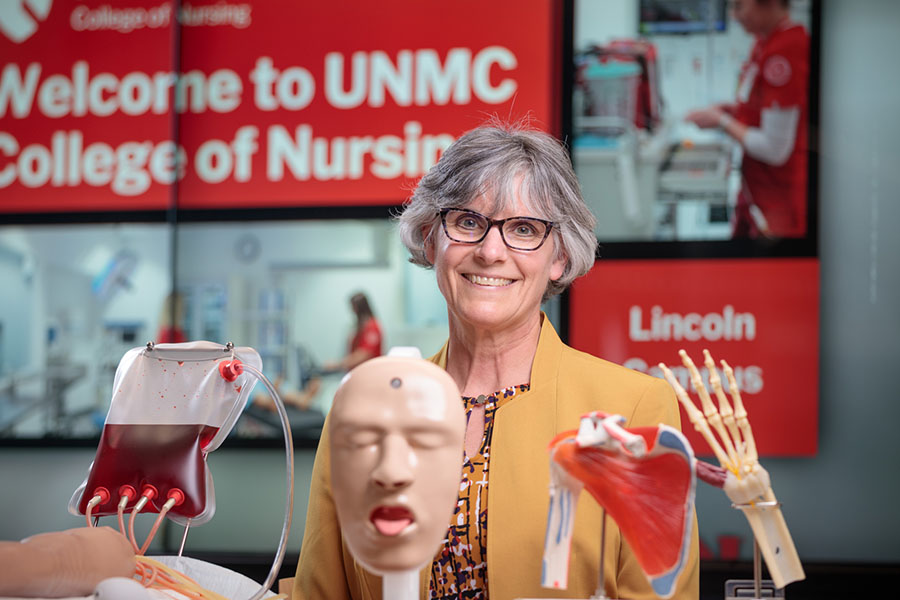
Michelle Johnson, PhD, discovering your strengths and passions is the first step toward a building a rewarding career in health care.
Michelle Johnson, PhD
Assistant dean, UNMC College of Nursing, Lincoln Division
What advice do you give young women entering health care?
- Take time to reflect on your strengths and your passions.
- Seek opportunities that draw on your strengths and grow your passions to have the greatest impact on your work and associated work outcomes.
- Be part of a supportive culture and positive work environment. It’s critical to fostering your development.
- Use your perceptions, attitudes, communications, actions, etc., to help create a culture where everyone is encouraged to thrive.
What more could UNMC do to encourage women in leadership roles? Formal mentorship programs, where mentors share their successes and failures, are a key part of the success equation. Their insight helps the next generation of leaders succeed. Membership on boards also is a way for rising stars to gain leadership experience.
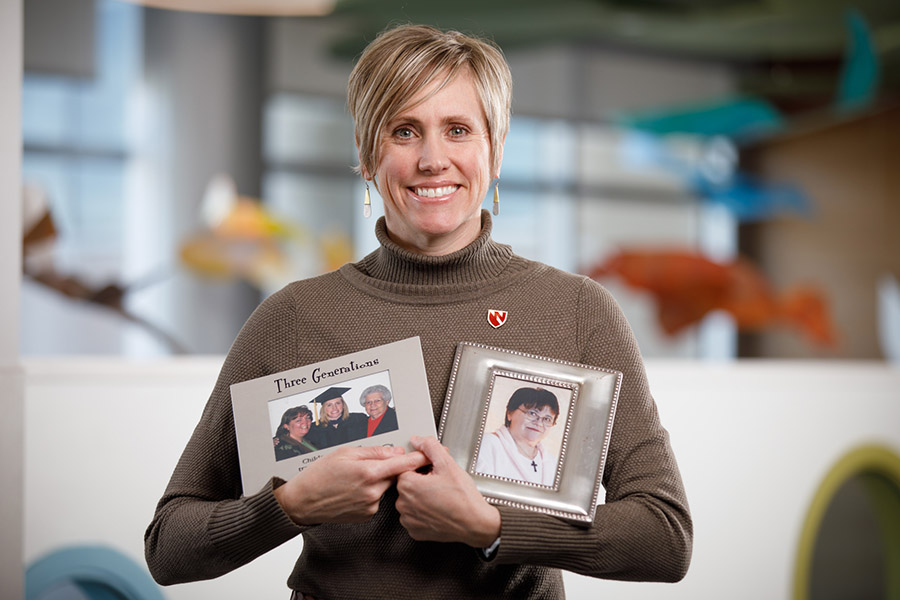
Brandy Clark, PhD, credits her grandmothers for encouraging her to be her best self at an early age.
Brandy Clarke, PhD
Director of equity, UNMC
What do you wish you’d known when you began your career? I had no idea what I was capable of until I did it.
Who has been your inspiration? My grandmothers, for their strong foundation of love, support and confidence. “Without that, I would not be here.”
What challenges do women in leadership roles face? Women in leadership need to be supported and respected and given the freedom to take risks and fail without fear. Their leadership styles and experiences need to be valued and seen as strengths.
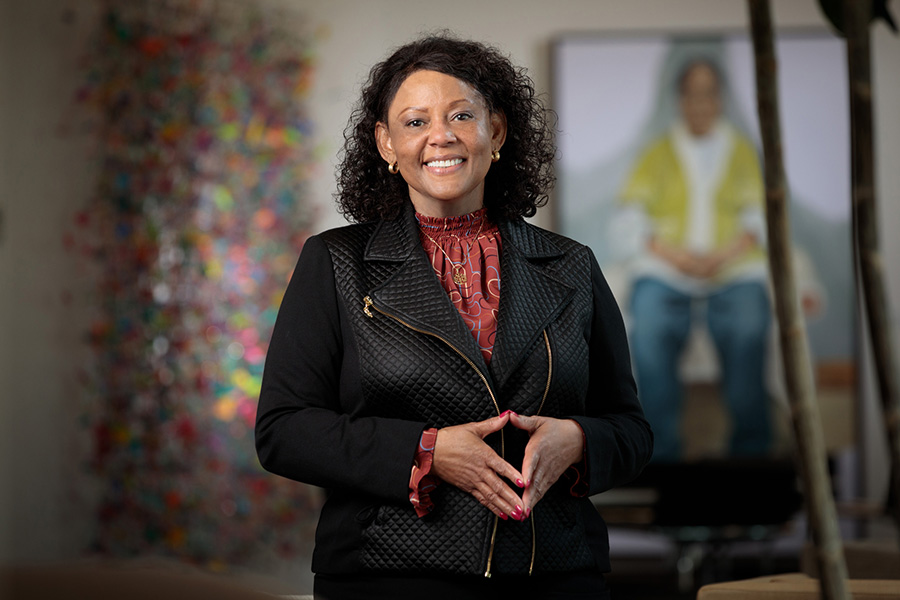
UNMC human resources expert Linda Cunningham stresses self-care for women at all ages and stages of life.
Linda Cunningham
Associate director, UNMC Human Resources
How do you define success? This Jack Welch quote has always resonated with me: “Before you are a leader, success is all about growing yourself. When you become a leader, success is all about growing others.”
What advice do you give young women entering health care?
- Believe in yourself.
- Make self-care a priority.
- Seek challenges and opportunities that leverage your strengths and if you’re truly blessed, there too, you will find joy.
- Surround yourself with positive people who inspire and support you.
- Let your haters be your motivators.
- Know in your heart that you ARE enough. Period.

